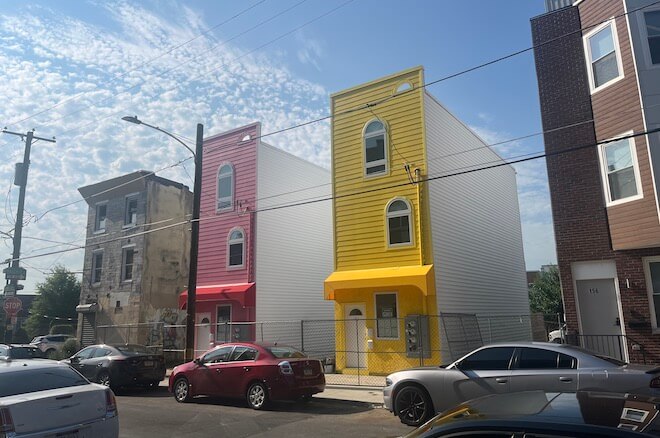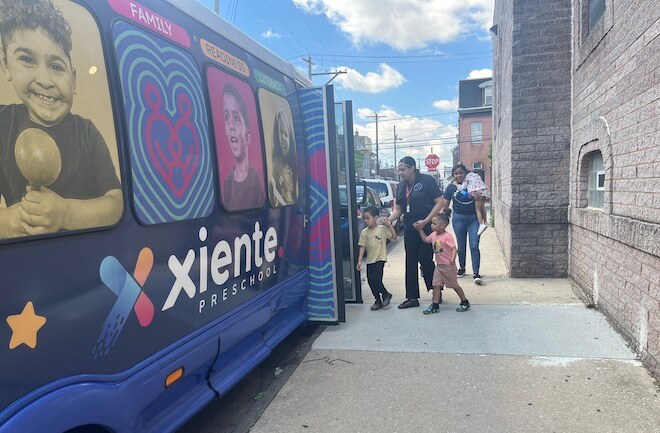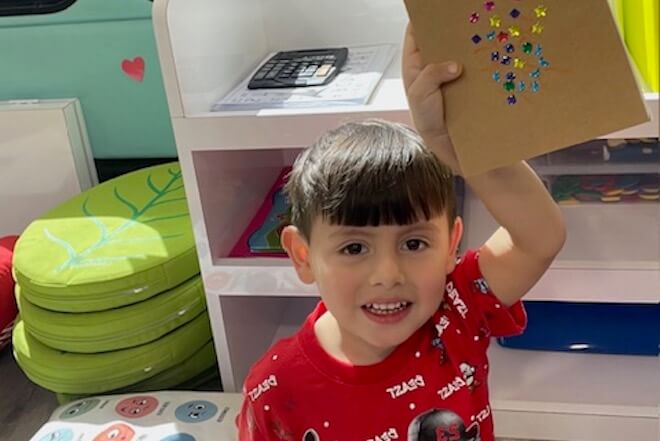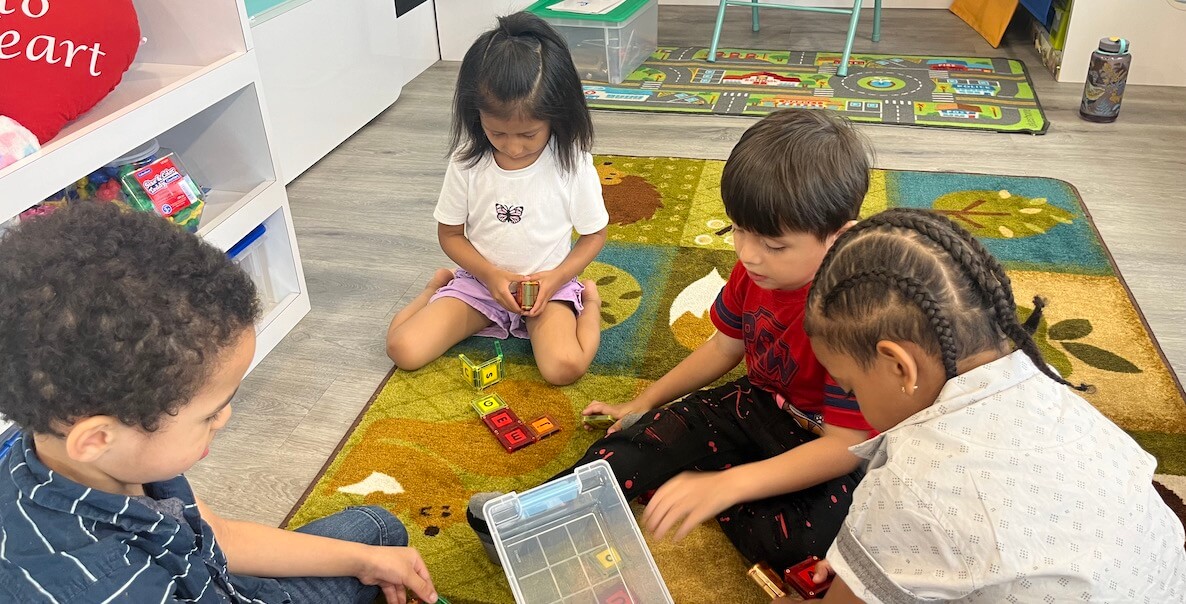Standing in front of a series of brightly colored row homes, Xiente CEO Dr. Michelle Carrera Morales can’t help but feel emotional. The houses, inspired by traditional Puerto Rican architecture, are part of Mi Casa, Xiente’s 10-unit affordable housing development that opened to residents in July.
To Carrera Morales, who grew up in poverty in Puerto Rico, the opening of Mi Casa signaled she had taken a step closer to achieving her dream of helping families in need achieve not only stable housing, but also the education and workforce development training needed to reach economic mobility. For the past 20 years, she’s worked with nonprofits, including the Boys and Girls Club in Atlantic City, to help give people the same opportunities she had. She joined Xiente in 2020.
“I had a deep calling to give back and to make sure that every kid had the same opportunity that I had of achieving economic mobility,” Carrera Morales says.
The Mi Casa houses are one of a number of Xiente initiatives intended to tackle poverty. This year, in addition to opening the Mi Casa development, the organization launched a mobile preschool to help prepare children ages three to five for kindergarten. It’s all part of the 40-something-year-old nonprofit’s two-generation approach, working with both parents and children.

A community alliance for Norris Square
Xiente got its start in 1982 as the Norris Square Community Alliance. Its founders were a group of mostly Latina women who lived nearby and wanted to revitalize the neighborhood so it would be safer for their children. (Norris Square is north of Fishtown and south of Fairhill and Kensington.)
In its first eight years, the organization rehabbed 137 W. Susquehanna Avenue and 188 Diamond Street into affordable apartments. By 1996, it had opened the Norris Square Family Center, where the group began offering after school programming for kids in elementary to junior high school. Over the organization’s lifetime, it’s built or rehabilitated more than 147 units of affordable housing and created a preschool program that serves nearly 300 children. They served close to 3,000 families across all of their programs in 2022 and now have 140 employees.
Carrera Morales joined the nonprofit four years ago, after Patricia DeCarlo, who had served as the executive director for Xiente’s entire existence, retired. Carrera Morales’ own life transformed when she went to college in Puerto Rico and later earned her doctorate in education. She worked there for a number of years after school, including for the Boys and Girls Club of Puerto Rico, before the Boys and Girls Club of Atlantic City recruited her to come to the mainland U.S. in 2015.
Tackling poverty across multiple generations
In 2023, the group decided it wanted to expand its services beyond Norris Square — not the least because in recent years, they’ve witnessed how rising gentrification has priced many in their community out of the neighborhood. So they changed the name to Xiente, a play on the Spanish word siente, which means feeling. They also announced that they’d be pursuing a new strategy, one targeted at helping multiple generations of families get out of poverty.
“Over 90 percent of the staff that work at Xiente either come from poverty or grew up in the communities that we serve,” Carrera Morales says. “[The new name] reflects the empathy that we can have because we know that sometimes in our country being poor becomes a full time job. Surviving becomes a full-time job. It’s a reminder that we will not lose our empathy.”
Economic hardship has increased among Hispanic residents in the city, even as economic hardship has slightly decreased in Philly as a whole since 2011. More than 33 percent of Hispanic Philadelphians live in poverty, according to Pew Charitable Trusts. What’s more, the community’s poverty tends to be generational. In 2023, the National Academy of Sciences found that 25 percent of Latino children born into poverty will remain in poverty throughout their lives.
“If you work with the adults and don’t focus on that child and make sure that that child is receiving the adequate education that they need … then you may help mom advance, but then here comes the kid behind her and they will stay trapped in that cycle.” — Dr. Michelle Carrera Morales
The idea for the two-generation approach began with Xiente’s Head Start and Early Head Start programs. Parents of students in those programs needed support finding jobs, accessing social services benefits, and generally improving economic mobility. Xiente began helping multiple generations of families somewhat informally but rather successfully.
Thought leaders and researchers at the Urban Institute, the Aspen Institute and the Annie E. Casey Foundation all back a two-generation approach. One study of the Jeremiah Program, which employs the approach, found these initiatives increase lifetime earnings for graduates in the first generation by $213,987 and $19,002 for those in the second. Xiente’s more formalized approach also includes tracking outcomes. They anticipate having data on how these programs have been working next year.
“The two-gen approach allows you to break the cycle of poverty,” Carrera Morales says. “If you work with the adults and don’t focus on that child and make sure that that child is receiving the adequate education that they need … then you may help mom advance, but then here comes the kid behind her and they will stay trapped in that cycle.”
Xiente board member Maridarlyn Gonzalez has seen how the organization’s two-generation approach has helped families in the area. (Gonzalez also works for Pew Charitable Trusts on the Philadelphia Research Team). She was raised in the neighborhood and has seen how Xiente has acted as a support system for members of the community when they’ve struggled financially. The financial support and housing counseling they offer is critical, in Gonzalez’s view as a board member, because when she worked at a domestic violence shelter she would see how people would go back to their abusers due to economic instability.
“I heard many stories of people turning to family and friends during times of financial distress. … The clients who had stronger support networks had a better outcome even as young adults, some with small children themselves,” Gonzalez says. “Xiente aims to programmatically create that supportive network for multiple families so that future generations have somewhere to pull from.”

Generation one: parents and caregivers
Xiente has three focus areas: Housing support, education and financial literacy, and economic mobility counseling.
Securing stable housing is often one of the first steps in breaking the cycle of poverty. Without reliable housing it can be difficult to get a job or government benefits.
Employers almost universally require job applicants to share addresses, and research has found employers are more likely to engage in discrimination if a job seeker lists temporary housing as a home. More than 70 percent of applicants surveyed by the National Coalition for the Homeless felt they’d faced employment/job discrimination because of housing status.
Although a fixed residence isn’t required to qualify for benefits like food stamps, the only way to receive benefits is by mail, so a mailing address is essential.
Xiente has a number of housing programs, including counseling services for renters and first time homebuyers and actual affordable housing developments like Mi Casa. Mi Casa families pay rent on a sliding scale based on their finances; unit prices range from 30 to 50 percent of the area median income (AMI), typically between $600 and $900 per month. The AMI for Norris Square ranges between $33,300 and $62,900, per reporting from Temple University.
Xiente’s lease contract starts at a year and can be renewed for up to five years, so long as the tenants actively engage with financial counseling services.
“It’s the commitment to the project that we’re seeing in our families that we’re excited about,” Carrera Morales says. “[Renters are] sitting down with housing counselors. They took a workshop about finance 101 and had an opportunity to ask a ton of questions and improve their knowledge in that area.”
The first round of Mi Casa developments was funded by $3 million in grants and loans from PHARE, Samuel Fels Fund, The Neighborhood Stabilization Program, and Chicanos Por La Causa. Xiente is currently in the process of raising another $6.5 million to build more Mi Casa units and is working with the Philadelphia Housing Authority in hopes of putting 20 more three- to four-bedroom units on the market next year.
The application for Mi Casa is short — just three or four pages. To qualify, applicants must be at or below 50 percent of the AMI for the area and must complete an intake process with an economic mobility counselor. Xiente tries to find tenants for the houses three to four months before construction is completed.
“For us, it’s very important to provide affordable housing. It’s kind of our anchor for the economic mobility of that family,” Carrera Morales says.
Generation two: bringing preschool to all
On the second generation side, Xiente has long offered a number of programs to help support education among children, from out-of-school programs and early learning programs to services for at-risk youth. This year, they launched the mobile preschool Busesito, which travels to help with kindergarten readiness.
The idea for Busesito came when Carrera Morales learned of mobile preschool programs run by the Colorado organization Valley Settlement, whom they’ve partnered with in the past. Valley Settlement launched its program, El Busesito Preschool, after surveys in 2011 and 2012 revealed that only one percent of three to five-year-old children in the low-income, Latinx communities they served were attending preschool, often because their parents did not have transportation to get them there.
“Xiente aims to programmatically create that supportive network for multiple families so that future generations have somewhere to pull from.” — Maridarlyn Gonzalez
In Philly, Carrera Morales saw that Xiente families with young children faced only slightly different barriers to accessing preschool programs. The Reinvestment Fund found in 2019 there were 97,943 available childcare spots for about 110,656 children — a 12 percent gap between supply and demand. The situation has only worsened since the pandemic, which saw childcare facilities close and a nationwide industry staffing crisis.
Rather than sending children to traditional preschools or daycares, parents are often relying on friends and family to watch their kids, Carrera Morales says, and so students are missing out on critical education to help get them ready for kindergarten. So, Xiente partnered with Vanguard and the William Penn Foundation to launch Philly’s own version of Busesito, which means “little bus” in Spanish.
“The idea of the Busesito is to be able to go out there in the community, establish a relationship with those informal providers, and then have a credentialed teacher come out twice a week to that community to serve the children,” she says.
Busesito currently partners with two churches, St. Joan of Arc (off Frankford Avenue in Harrowgate) and The Cenacle at the Padre Pio Prayer Center (on Church Street in Frankford), where they park the bus so parents can bring their children to learn. Xiente employs two credentialed, bilingual preschool teachers who use the Learning Without Tears curriculum, to help prepare students for kindergarten by focusing on letter and number recognition and handwriting skills. Seven children are enrolled in the pilot of the program. Xiente is looking to partner with more informal childcare providers this year.
Yensy Osorio Corea’s four-year-old son Carlos goes to Busesito on Monday and Wednesday. She learned about the program through The Cenacle. Prior to Busesito, Carlos did not attend preschool. Now, he plays with other children, sings songs, does crafts and is learning his letters and numbers.
“My son is learning a lot,” Osorio Corea says through a translator.

Economic mobility for all
The third piece of Xiente’s focus, economic mobility counseling, impacts everyone from elderly community members to the youngest students in the preschool. In 2023, they launched their economic mobility plans which will offer individualized support to help families pursue education, identify career opportunities and generally develop strategies to get — and stay — out of poverty.
Prior to implementing the economic mobility plans, Xiente offered a number of workforce education programs, from computer classes for older adults who are looking to upskill to compete in today’s job market, to 12-session job readiness programs for young people aged 16 to 21 to help them build careers — sometimes by working with the older adults. They also offer paid internships to people aged 16-years and older to teach their computer literacy classes for seniors. Nearly 100 adults participated in their digital literacy courses in 2022.
“Our main mission is to transform communities by empowering individuals to achieve economic mobility,” Carrera Morales says.
Stephanie Santiago is an economic mobility counselor with Xiente. Growing up, her mom turned to Xiente after she was laid off from her job and was struggling financially. The organization gave her a job as an intake specialist and allowed her to bring the then five-year-old Stephanie to work.
Throughout her teenage years, Santiago participated in a number of Xiente’s programs, taking coding classes and even getting a free laptop from the organization to help her with her studies. Xiente provided credit counseling as she got older and started living on her own. Today, she has a masters degree in human services and came back to the organization because she wants to support others. Her daughter participates in the preschool program. Other members of her family have been able to purchase their homes because Xiente helped them apply for first-time home buyer grants.
“Everybody’s journey through economic mobility is different, but with the combined services that we have with the housing counselors and with the early learning programs and youth programs, we’ve seen families really grow,” Santiago says.
“Xiente has allowed me to obtain a really good position of employment, I’m doing something I love.”
Xiente’s youngest population, the Busesito preschoolers and the Head Start and Early Head Start students, don’t receive education about household finances or economic mobility directly. They need to focus on learning their ABCs and 123s. But their families receive counseling on housing support and financial literacy. The goals they set vary based on each family’s needs — some want to enroll in English as a second language classes; others want to improve their credit scores and secure stable housing — but many participants are making progress. More than 60 percent of the families in the program have made progress in their economic mobility plans over the past six months.
“The children will [focus]… on their education — whether it’s quality preschool that we provide or afterschool support to make sure that they are either ready to access a college education or ready to access a vocational career when they finish high school,” Carrera Morales says.
“And then on the parent side is that economic mobility counseling of: Where is your family right now? Do they need housing services to stabilize them? How can we build up their social capital, their human capital and their physical capital so that they achieve that economic mobility?”
![]() MORE SOLUTIONS TO THE POVERTY PROBLEM
MORE SOLUTIONS TO THE POVERTY PROBLEM



